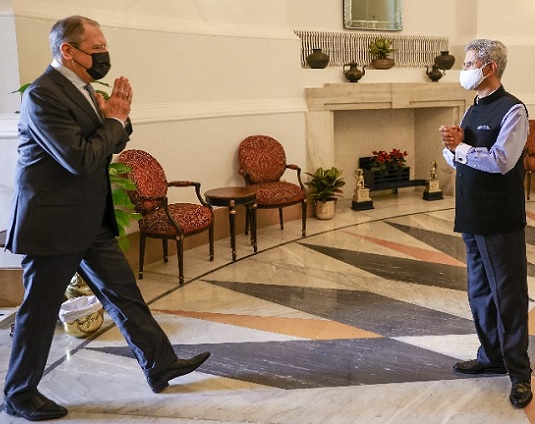India and Russia on Tuesday went ahead with a 'confidential exchange of views' ranging from the fight against Covid-19, the crisis in Afghanistan and stepping up of military collaboration, during talks between Russian Foreign Minister Sergey Lavrov and India's External Affairs Minister S. Jaishankar in New Delhi today.
As per the Russian Foreign Ministry, the coincidence of the approaches of Russia and India to pressing global and regional problems, including a peaceful settlement in Afghanistan, the Syrian crisis, the situation around the Iranian nuclear program, as well as a common understanding of the principles of forming a reliable security architecture in the Pacific and Indian Oceans, was stated during the high-level interaction.
Taking to Twitter after the meeting, Jaishankar said that talks with Lavrov were "warm, comprehensive and productive" as India-Russia ties are characterised by consistent ability to identify and update shared interests.
"Discussed preparations for the Annual Summit later this year. Agenda included UNSC issues, Afghanistan, West Asia, the Gulf, Myanmar, ASEAN and the Indo-Pacific. Larger backdrop of global political changes provided the context," said the External Affairs minister.
India and Russia, in particular, emphasized the mutual intention to strengthen the coordination of joint actions in the international arena and in multilateral formats, primarily in the United Nations, as well as BRICS, Shanghai Cooperation Organisation (SCO) and the Russia-India-China (RIC) grouping.
"Our countries are linked by a particularly privileged strategic partnership. They are based on the long-term friendship of our peoples, the similarity of positions on topical international problems," said the Russian Foreign Minister while making his opening remarks to the talks.
"I would especially note the mutual readiness, proven by life, to take into account each other's interests in international affairs to the maximum. Our bilateral political dialogue, as you just said, is at a consistently high level even under severe epidemiological constraints," he added.
ALSO READ: In Dushanbe, Jaishankar proposes three-point plan to address Afghan crisis

Russia said that additional opportunities for cooperation between the two nations "are opened by India's chairmanship of the BRICS this year and participation in the UN Security Council as a non-permanent member."
While the both parties agreed to continue an active political dialogue at all levels, Russia said that a common commitment was reaffirmed to the formation of a polycentric world order based on fair and democratic principles and the rule of law.
"Our dialogue between the foreign ministries is very productive, trusting and useful. The next summit and summit meetings are on the agenda," Lavrov opined pointing that preparations for President Vladimir Putin's visit to New Delhi for the India-Russia summit later this year have already begun.
Lavrov now travels to Pakistan where he is scheduled to hold talks with country's Foreign Minister Shah Mehmood Qureshi as well as the top political and military leadership.
Besides the latest situation in Afghanistan, Moscow said that the priority task during the talks with Islamabad is to achieve the expansion of trade and economic ties which amounted to $ 790 million in 2020, majorly due to large supplies of Russian wheat.
Another promising area of business partnership between Pakistan and Russia is energy with the construction of the North-South gas pipeline from Karachi to Lahore being the flagship project.
The Putin government is also interested in the modernization of the Karachi Metallurgical Plant, which is built with the assistance of the USSR, the reconstruction of the energy and railway systems of Pakistan, as well as the supply of Russian civil aircraft.




















